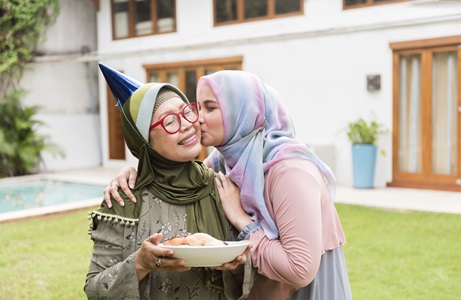Family history of breast cancer
See this information in a language other than English.
BreastScreen WA is a free screening mammography service for women. It is an important health check for women aged 50–74 years but women from age 40 years or over may attend. This information should answer some of the questions you may have about screening mammography if you have a relative who had breast cancer.
What does it mean to have a family history of breast cancer?
- At least one member of your family has developed breast cancer.
 When several members of the same family have been diagnosed with the same disease, it is natural to wonder if it is due to an inherited factor.
When several members of the same family have been diagnosed with the same disease, it is natural to wonder if it is due to an inherited factor.- Breast cancer itself cannot be inherited, but the faulty breast cancer genes can be inherited. If a woman has a faulty gene she is at increased risk, but is not certain to develop breast cancer.
- Most breast cancer occurs by chance alone and is not caused by genetic factors. Between 1–5% of all breast cancers are due to an inherited genetic disorder.
Reassuring facts for women with a family history of breast cancer
For many women, knowing they have a family history of breast cancer is cause for concern. It is, however important to keep in mind:
- Australian women have a 1 in 7 chance of developing breast cancer in their lifetime.
- Breast cancer is a common disease which is largely associated with increasing age.
- Having a mother or sister with breast cancer does not necessarily mean you will be at an increased risk of developing breast cancer.
- Developing breast cancer does not mean you have necessarily inherited the faulty gene, or will pass it on to your children.
- About 9 out of every 10 women who develop breast cancer do not have any family history of the disease.
Remember
- Most women who are diagnosed with breast cancer DON'T have a family history of the disease.
- The earlier a cancer is detected, the greater the likelihood of successful treatment.
Your family history becomes more important:
- When more than one relative on the same side of your family (mother or father’s side) has been diagnosed with breast cancer.
- When those relatives were aged less than 50 years when first diagnosed.
- When those relatives with breast cancer are more closely related to you (sister rather than cousin).
- When there is breast cancer in both breasts, male breast cancer, or breast and ovarian cancer in the family.
How does having a family history affect me accessing BreastScreen WA?
BreastScreen WA recommends regular two yearly screening mammograms particularly for women aged 50–74 years, as research shows the benefit of screening mammography is greatest in this age group. Women aged 40–49 and 75 or over are also welcome to attend for a mammogram.
BreastScreen WA collects your family history information at the time of screening. For a small number of women, the nature of their family history may require them to attend more frequently for a screening mammogram.
If I have a family history of breast cancer, at what age should I start screening, and how often should I be screened?
Women from the age of 40 with a significant family history of breast cancer are eligible for a screening mammogram every year if they have one of the following:
- One or more first degree relatives (mother, sister, daughter, father, brother, son) with breast cancer diagnosed before the age of 50;
- One or more first degree relatives with cancer in both breasts (diagnosed at any age);
- Two or more first degree relatives with breast cancer (diagnosed at any age).
Women with one first degree relative diagnosed with breast cancer over the age of 50 are at NO greater risk than that of the average woman in the community. These women will be offered a screening mammogram every two years.
What else should I do?
If you are concerned about your family history of breast cancer, you should discuss your individual circumstances with your family doctor. If there are any new cases of breast cancer diagnosed in your family since your last mammogram it is important that you inform both BreastScreen WA and your GP.
Information about Family History of breast cancer is also available in 32 languages other than English.
Get to know your breasts and what is normal for you. Look in the mirror at your breasts and feel your breasts from time to time.
If you notice any unusual changes in your breasts such as lumps, nipple discharge, or persistent new breast pain, even if your last screening mammogram was normal, please see your GP promptly.
Ask your GP about breast health at your next check-up.
Use our contact form or call BreastScreen WA on:
13 20 50 for appointments
9323 6700 for information

